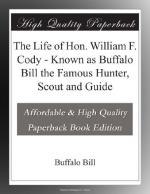It was with the survivors of this terrible fight that I spent the few days at Hays City, prior to the arrival of the Fifth Cavalry.
CHAPTER XVIII.
SCOUTING.
On the third day of October the Fifth Cavalry arrived at Fort Hays, and I at once began making the acquaintance of the different officers of the regiment. I was introduced by General Sheridan to Colonel William Royal, who was in command of the regiment. He was a gallant officer, and an agreeable and pleasant gentleman. He is now stationed at Omaha as Inspector General in the department of the Platte. I also became acquainted with Major W.H. Brown, Major Walker. Captain Sweetman, Quartermaster E.M. Hays, and in fact all the officers of the regiment.
General Sheridan, being anxious to punish the Indians who had lately fought General Forsyth, did not give the regiment much of a rest, and accordingly on the 5th of October it began its march for the Beaver Creek country. The first night we camped on the South fork of Big Creek, four miles west of Hays City. By this time I had become pretty well acquainted with Major Brown and Captain Sweetman, who invited me to mess with them on this expedition; and a jolly mess we had. There were other scouts in the command besides myself, and I particularly remember Tom Renahan, Hank Fields and a character called “Nosey” on account of his long nose.
On the morning of the 6th we pulled out to the north, and during the day I was very favorably struck with the appearance of the regiment. It was a beautiful command, and when strung out on the prairie with a train of seventy-five six-mule wagons, ambulances and pack mules, I felt very proud of my position as guide and chief of scouts of such a warlike expedition.
Just as we were about to go into camp on the Saline river that night, we ran on to a band of about fifteen Indians, who, seeing us, dashed across the creek, followed by some bullets which we sent after them; but as the small band proved to be a scouting party, we pursued them only a mile or two, when our attention was directed to a herd of buffaloes—they being very plenty—and we succeeded in killing ten or fifteen for the command.
The next day we marched thirty miles, and late in the afternoon we went into camp on the South fork of the Solomon. At this encampment Colonel Royal asked me to go out and kill some buffaloes for the boys.
“All right, Colonel, send along a wagon or two to bring in the meat,” I said.
“I am not in the habit of sending out my wagons until I know that there is something to be hauled in; kill your buffalo first and then I’ll send out the wagons,” was the Colonel’s reply. I said no more, but went out on a hunt, and after a short absence returned and asked the Colonel to send his wagons over the hill for the half dozen buffaloes I had killed.




